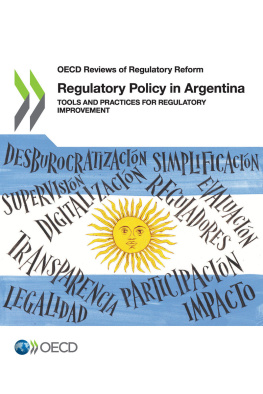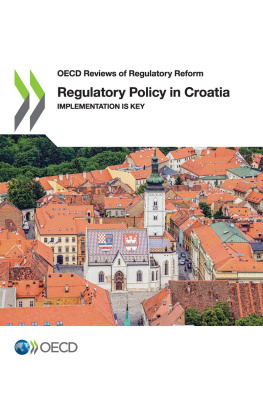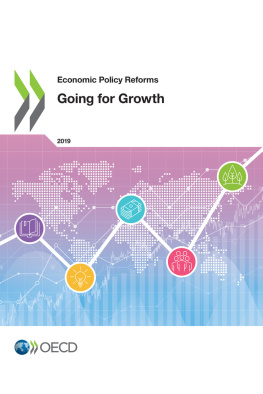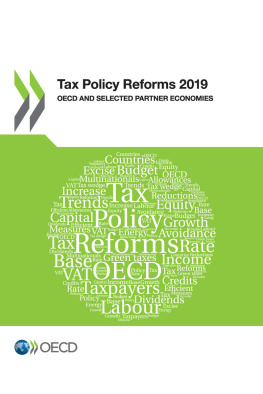OECD - Policy Responses to New Forms of Work
Here you can read online OECD - Policy Responses to New Forms of Work full text of the book (entire story) in english for free. Download pdf and epub, get meaning, cover and reviews about this ebook. year: 2019, publisher: OECD Publishing, genre: Politics. Description of the work, (preface) as well as reviews are available. Best literature library LitArk.com created for fans of good reading and offers a wide selection of genres:
Romance novel
Science fiction
Adventure
Detective
Science
History
Home and family
Prose
Art
Politics
Computer
Non-fiction
Religion
Business
Children
Humor
Choose a favorite category and find really read worthwhile books. Enjoy immersion in the world of imagination, feel the emotions of the characters or learn something new for yourself, make an fascinating discovery.
Policy Responses to New Forms of Work: summary, description and annotation
We offer to read an annotation, description, summary or preface (depends on what the author of the book "Policy Responses to New Forms of Work" wrote himself). If you haven't found the necessary information about the book — write in the comments, we will try to find it.
OECD: author's other books
Who wrote Policy Responses to New Forms of Work? Find out the surname, the name of the author of the book and a list of all author's works by series.
Policy Responses to New Forms of Work — read online for free the complete book (whole text) full work
Below is the text of the book, divided by pages. System saving the place of the last page read, allows you to conveniently read the book "Policy Responses to New Forms of Work" online for free, without having to search again every time where you left off. Put a bookmark, and you can go to the page where you finished reading at any time.
Font size:
Interval:
Bookmark:

OECD (2019), Policy Responses to New Forms of Work , OECD Publishing, Paris.
https://doi.org/10.1787/0763f1b7-en
Globalisation, technological progress and demographic change are having a profound impact on labour markets, affecting both the quantity and quality of jobs that are available, as well as how and by whom they are carried out. The future of work offers unparalleled opportunities, but there are also significant challenges associated with these mega-trends. It is important that policy makers strengthen the resilience and adaptability of labour markets so that workers and countries can manage the transition with the least possible disruption, while maximising the potential benefits.
Against this backdrop, the OECD Future of Work initiative looks at how demographic change, globalisation and technological progress are affecting job quantity and quality, as well as labour market inclusiveness and what this means for labour market, skills and social policy.
This report contributes to this initiative by providing a snapshot of the policy actions being taken by countries in response to growing diversity in forms of employment, with the aim of encouraging peer learning where countries are facing similar issues. In recent years, many countries have seen the emergence of, and/or growth in, particular labour contract types that diverge from the standard employment relationship and are reflecting on whether existing policies and institutions are capable of addressing effectively the current (and future) challenges of a rapidly changing world of work.
The work on this report was carried out by Marguerita Lane in the Skills and Employability Division of the Directorate for Employment, Labour and Social Affairs, with inputs from Ann Vourch, under the supervision of Stijn Broecke (Future of Work Team Manager) and Mark Keese (Head of the Skills and Employability Division). The report benefitted from helpful comments provided by colleagues from the Directorate for Employment, Labour and Social Affairs: Stefano Scarpetta (Director) and the authors of the 2019 OECD Employment Outlook; and from Anna Milanez from the Centre for Tax Policy and Administration. Project assistance was provided by Katerina Kodlova.
Thanks to all survey respondents within the Ministries of Labour in the participating countries, without whose efforts, this report would not have been possible. The report was also informed by incisive contributions by participants at the workshop and conference, held at the OECD Conference Centre in Paris on 16 March 2018 and 7 November 2018, respectively.
Finally, the Secretariat is particularly grateful to Max Uebe, Istvan Vanyolos, Carola Bouton and Chiara Riondino from the European Commission for their considerable contributions to ensuring successful completion of this project.
This document was produced with the financial assistance of the European Union. The views expressed herein can in no way be taken to reflect the official opinion of the European Union.
Recent labour market trends have prompted countries to reflect on whether existing systems of labour legislation, lifelong learning, social protection, taxation and collective bargaining are still fit for purpose. While in some cases they are, in others policies may need to be adapted to ensure protection for vulnerable workers and to prevent abuse, and to ensure that firms that comply with the regulations are not unduly disadvantaged.
This report provides a snapshot of the policy actions being taken by countries in response to growing diversity in forms of employment, with the aim of encouraging peer learning where countries are facing similar issues. The findings are based on a survey by the OECD and the European Commission of 44 Ministries of Labour (or the ministry with responsibility for labour market policy) in OECD, EU and G20 countries, carried out primarily between June and August in 2018.
The survey shows that many countries are reflecting on whether existing policies and institutions are capable of addressing effectively the current (and future) challenges of a rapidly changing world of work. In some cases, they are. In cases where they are not, a number of countries are already taking action to ensure protection for vulnerable workers and to prevent abuse.
While each countrys situation is different, the report highlights a number of areas of common concern. One key issue mentioned by many countries is that of self-employment and, in particular, the issue of misclassification and the challenge of classifying workers that fall in between the traditional definitions of dependent employment and self-employment. Many countries acknowledged that ensuring the correct classification is key to ensuring access to labour and social protection, as well as to collective bargaining and lifelong learning but even beyond the issue of classification, countries have made efforts to extend rights, benefits and protections to previously unprotected workers. For some countries, reducing differences in tax treatment between contract types could help reduce the risk of misclassification.
Several countries also report significant media and public debate on the topic of platform work : how to classify these workers and how to ensure adequate working conditions. A number of countries have already taken policy action in relation to platforms in the passenger transport sector, regulating the way they operate and imposing reporting obligations in relation to taxation.
Concerns are also raised about working conditions in fixed-term contracts and in variable hours contracts, the potential excessive and/or improper use of these working arrangements, as well as the potential disproportionate impact on younger people and on new entrants to the labour market. Regulation has attempted to strike an appropriate balance, allowing flexibility while preventing firms from using these arrangements to circumvent regulations associated with standard employment.
Font size:
Interval:
Bookmark:
Similar books «Policy Responses to New Forms of Work»
Look at similar books to Policy Responses to New Forms of Work. We have selected literature similar in name and meaning in the hope of providing readers with more options to find new, interesting, not yet read works.
Discussion, reviews of the book Policy Responses to New Forms of Work and just readers' own opinions. Leave your comments, write what you think about the work, its meaning or the main characters. Specify what exactly you liked and what you didn't like, and why you think so.



















